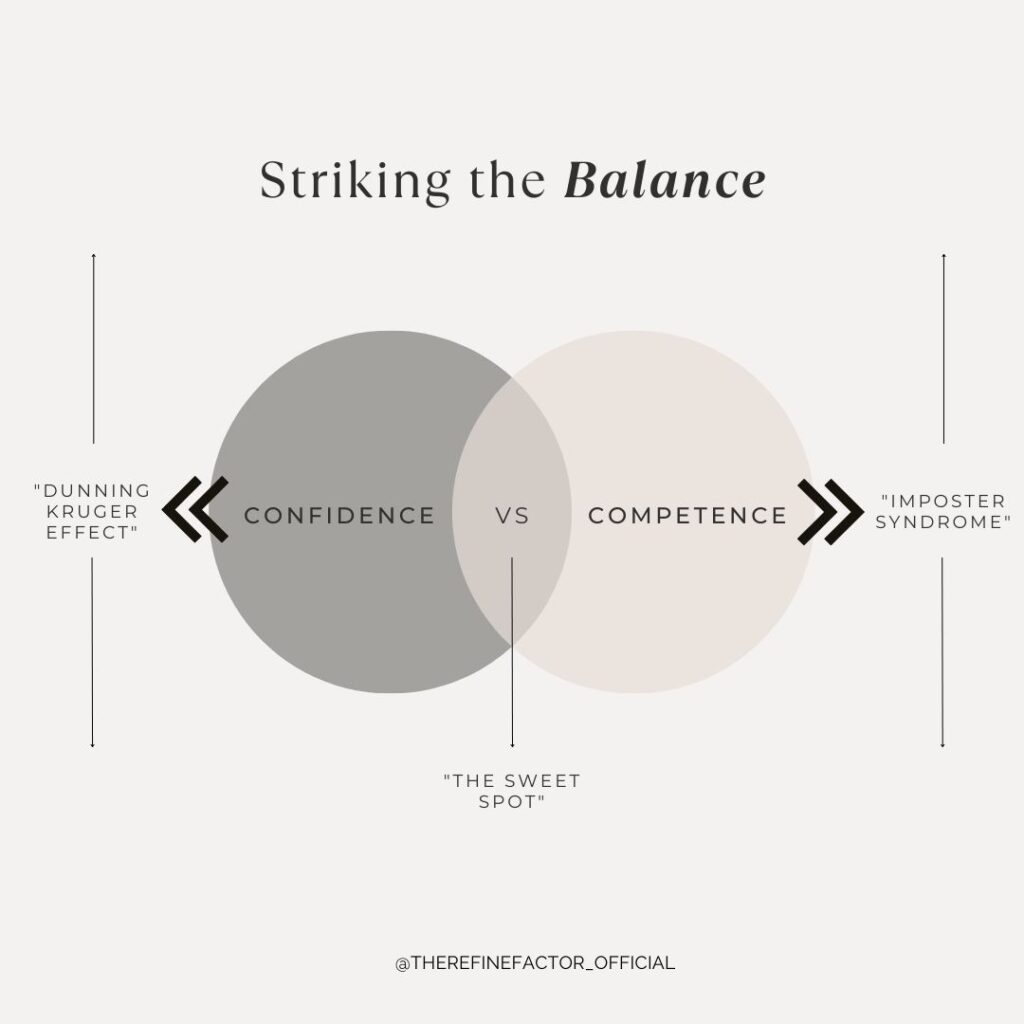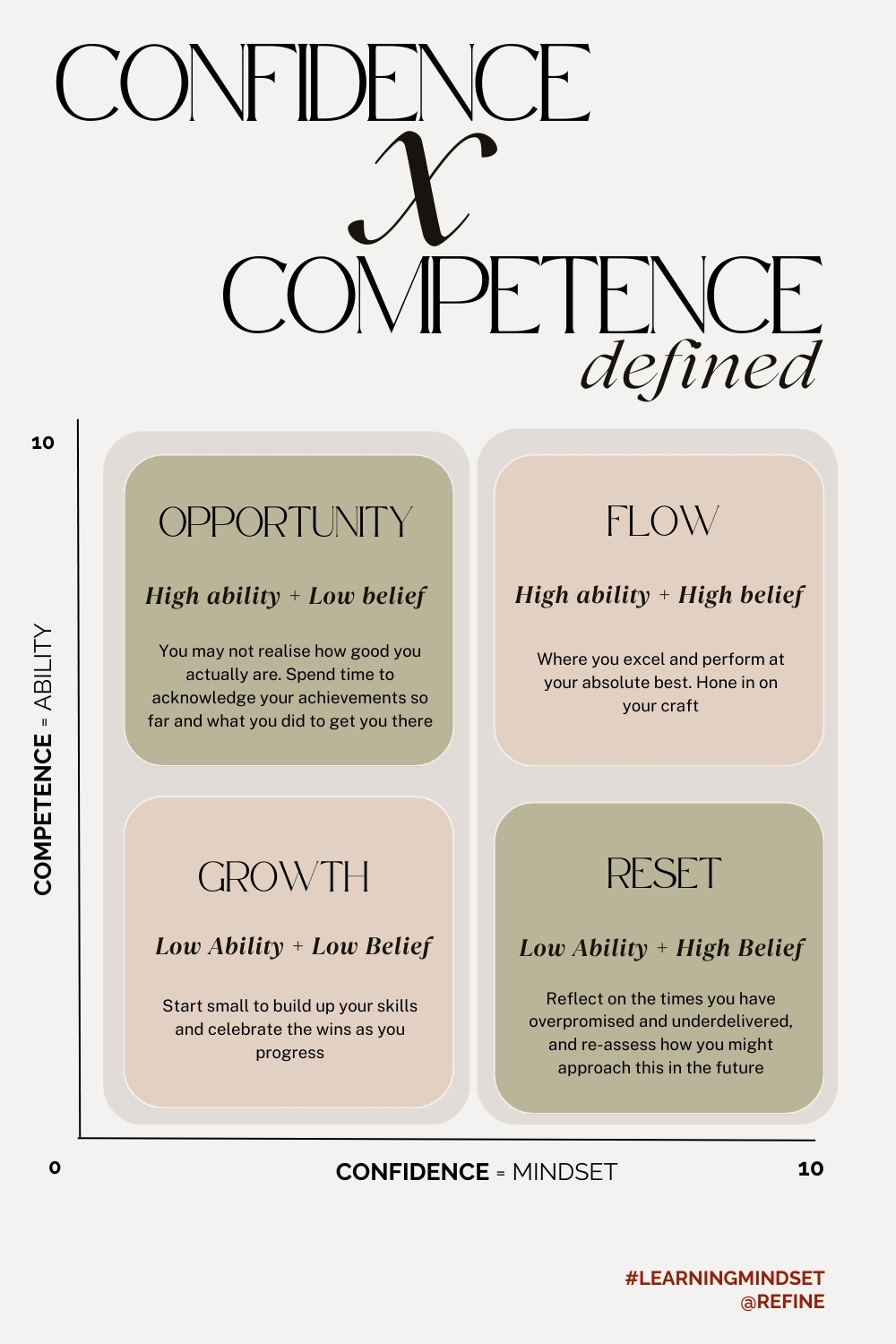MINDSET, CONFIDENCE / 1 JULY 2023
Beyond Looks: The Real Deal with Confidence vs Competence

Confidence vs Competence. Whats more important?
I’ve heard it all too many times, “She didn’t get promoted because she wasn’t confident enough”, “You’re doing a great job, but I think you need to focus on improving your confidence”
What does “not confident enough” actually mean?
How do I get more of this ‘confidence’ that everyone keeps telling me I need in order to be successful?
And why do we continue to put women in the “lacking confidence” box as a reason for gender inequality in the workplace?
Let’s deep dive a little further to uncover the truth behind the confidence trap and what we can do to shift this way of working.
Confidence Culture Defined
Confidence is simply defined as an individuals internal belief on their ability to do or achieve something. It is a mindset, not a performance indicator and therefore cannot be defined by anyone else but the individual in question.
If a high level of confidence doesn’t always equate to a high level of performance, why do we still continue to use ‘confidence’ as a benchmark to rate an individual’s ability to do a good job at work?
We’ve all been guilty of making snap judgments based on surface-level impressions. How often have we assessed a colleague’s performance without all the facts? And what about our own self-evaluations?
How many times have we uttered the words, “I want to increase my confidence in ______” during a performance review? I admit, I’ve done it too. But what we’re truly expressing with such a statement is, “I want to enhance my skills to deliver ______ ,” or “I seek greater exposure to ______ to gain insights and expertise needed to achieve .”
We need to find ways to challenge ourselves to redefine our language instead of relying on the vague notion of confidence, let’s accurately describe what it is that we aim to accomplish.
Try This Exercise: The next time you catch yourself using “confidence” to define your ability or lack thereof, whether it’s in the workplace, pursuing a goal, or trying on something new, replace it with a detailed description of your aspirations and intentions.
Confidence vs Competence
“The whole problem with the world is that fools and fanatics are always so certain of themselves, and wise people so full of doubts” – Betrand Russell
When it comes to overall performance, whether it’s for ourselves or others, taking a step back and looking at the bigger picture is crucial. This is where competence plays a vital role.
Competence is defined by an individual’s ability to successfully and efficiently accomplish tasks. However, in today’s workplace culture, there is a tendency to reward those who excel at self-promotion. Unfortunately, this can lead them down a path of complacency or, even worse, foster an inflated perception of their own abilities. This is a phenomenon known as the Dunning-Kruger Effect. On the flip side, highlighting a lack of confidence in someone can trigger feelings of being an ‘imposter,’ generating negative thoughts, self-doubt, and ultimately demotivation.
To overcome these challenges, it’s essential to delve deep within ourselves and gain an understanding of our strengths, skills, experiences, and achievements. We must also address the thoughts, reasons, or doubts that our minds present to us. By doing so, we can achieve better self-awareness and reduce blind spots that hinder our progress.
Striking the Balance: Competence vs Confidence

The visual above can enhance your awareness of where you currently stand on the confidence vs. competence scale. By embracing this awareness, you can develop effective strategies for improvement, thereby increasing your chances of long-term success
And remember, the purpose is not to compare yourself to others or feel overwhelmed. Instead, view it as a tool for self-reflection and growth.
Try This Exercise:
Next time, you’re faced with a challenge draw a box (3×3) and write the following in each of the boxes:
- Information: I don’t know what to do or where to find out
- Skill: I don’t have the skills to succeed in this area
- Belief: This will never happen
- WellBeing: I am too tired/stressed/unwell to deal with this
- Other People: My boss/family/friends make it difficult for me
- Motivation: I can’t get started, I don’t really care enough
- Time: There aren’t enough hours in my day
- Money: I can’t afford to do this
- Fear: I feel sick at the though of this idea
In each of the boxes. give yourself a score of 1 to 10. 1 being an area of weakness and 10 being an area of strength.
Look at your areas of strength.
How you can move forward with this?
What are the areas that you need to work on?
How will you achieve that?
Faking It Until You Make It
I can recall, many years ago when I was selected to undergo a trainee program early on in my career. The program was extremely selective, highly demanding and definitely not for the faint hearted.
The program consisted of a year long of monthly modules. It was a comprehensive program that required pre work, group workshop participation followed by a post work assignment. The assignment usually involved a presentation to senior executives within the business. After graduating, out of all my colleagues the ones that were most ‘successful’ were the ones who spoke with conviction, self promoted, and funnily enough had the least on the job experience. The ones who didn’t succeed, (which in this context would be defined as not receiving a promotion or failing to pass or complete the program) were my colleagues who struggled to actively participate, voice their skills during presentations but on the contrary were high skilled at all of the technical skills required to excel at their job.
Of the colleagues that were successful and went on to bigger roles with more accountability, half of them failed to live up to the expectations that they promised to deliver during the program. They were simply overcompensating for their lack of technical skills with their persuasive influential skills and being rewarded for it. Short wins but long term loss. Was it worth it?
What is the solution?
It all comes down to being more self aware and understanding your true capabilities. It might help to break this down in four distinct areas where your ability meets your awareness. Here we’ve identified 4 potential zones that can sit inside or outside your comfort zone.
OPPORTUNITY
There is such potential here. You’ll be glad to note that you are exceptionally great at this skill but for some reason your limiting beliefs are holding you back. Time to ask yourself why. Why are you playing it safe?
- High ability + Low belief
- Outside comfort zone
GROWTH
This is the area where you know that there is a learning curve ahead of you. You are fully aware of this. Persistence and discipline is critical when you are in this zone. Find ways to stay motivated by seeing yourself micro goals and celebrating the successes along the way. Remember, progress not perfection. We all started somewhere.
- Low Ability + Low Belief
- Outside comfort zone
FLOW
This can be quite the cosy zone for many. It’s a place that feels comfortable and you seem to be getting results without even trying. The danger here is complacency and could face missing out on unexpected opportunities . Try to broaden your horizons a little here and find ways of gaining more perspective. Seek inspiration and lean on others to see if there are new ways, methods or learnings to explore.
- High ability + High belief
- Inside the comfort zone
RESET
When you are in this zone, you might be getting results you want but for how long? The risk you take by spending too much time here is that ‘faking it until you make it’ may only take so far. If you can’t come up with the goods later, then people are going to start doubting your abilities and lose respect.
Ask yourself, am I getting the results or am I just finding ways to cover my tracks by overcompensating with something else? Being humble and asking questions when unsure is part of the learning journey. I’ve seen this far too many times in first time manager positions and it can lead to all sorts of problems later. Better to be honest with yourself and others about your true capabilities – delegate, outsource, additional training, the support it endless.
- Low Ability + High Belief
- Inside the comfort zone

We need to starting having accurate beliefs on how likely we are to succeed. We can do this by reflecting between tasks or projects and gaining feedback from those around you.
To be truly successful it’s important that we have a deep understanding of our competencies and confidence. Understand where you might sit in each of By believing in your abilities and skills, you can conquer any obstacle. With dedication and hard work, you can maximise your full potential within. Keep striving towards your goals and remember that the opportunities are limitless.
Let’s look at ways we can cultivate a culture where competence is recognised. We need to find a balance where skills are honed, and individuals are supported on their unique paths to success.






Read the Comments +